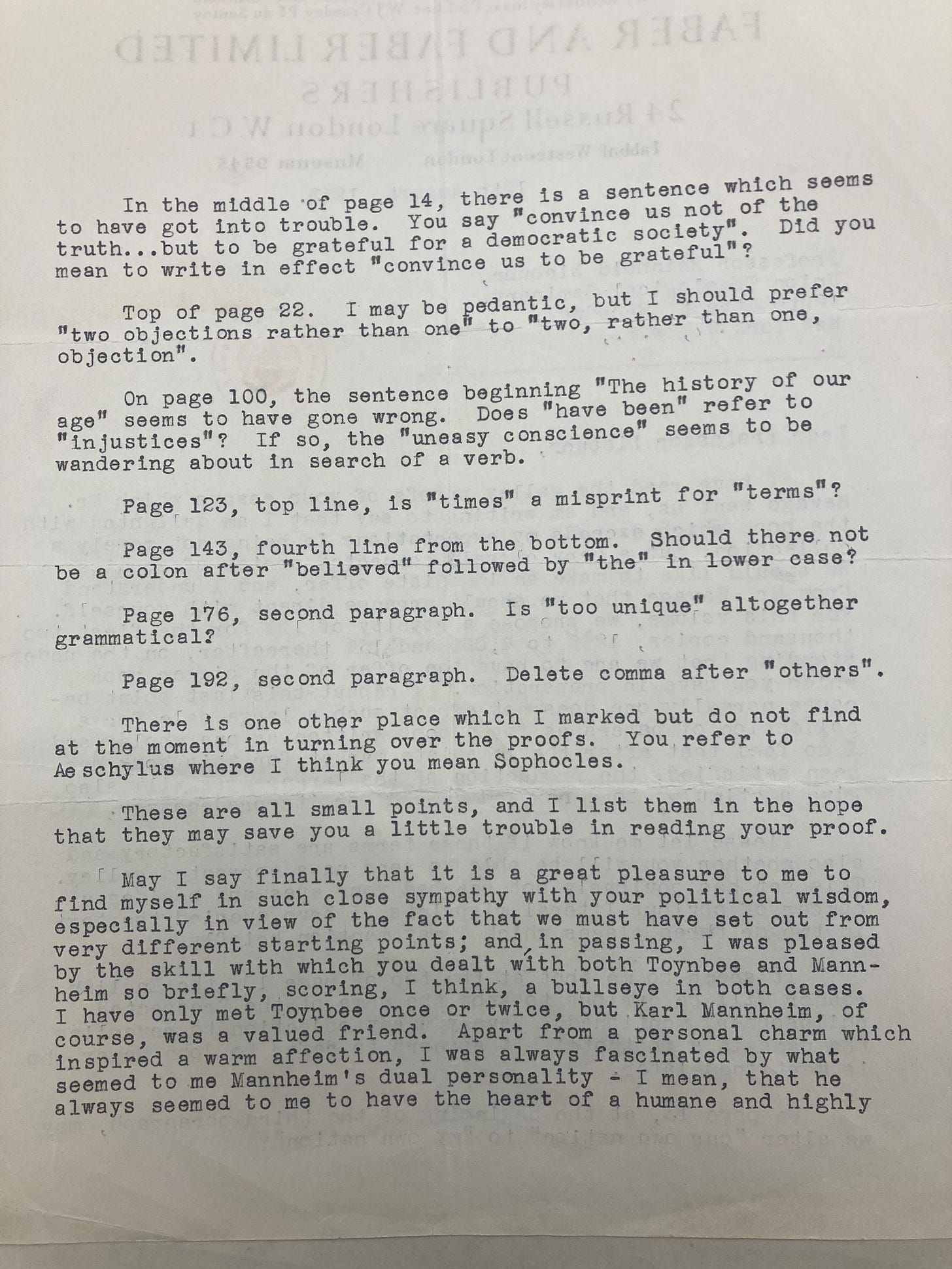Reinhold Niebuhr
Last year, I worked through a good chunk of Niebuhr’s unpublished writings (housed at the Library of Congress). Mark Tooley and James Diddams over at Providence were so kind as to put two of them into circulation online: “The Revival of Religion in America” and “The World I Would Like to Live In.” Niebuhr was ghosted on the one and rejected on the other, even though both publications had pitched him on the pieces (and in one case, stiffed him the modern equivalent of $2,000 in the process).
I found it both hilarious and extremely humanizing to read through Niebuhr’s correspondences. Even at the height of his fame (Gifford Lectures, face of TIME magazine), Niebuhr still had to deal with rejections.
I also found correspondences between Niebuhr and T. S. Eliot. Eliot had a lot of fascinating interactions with his contemporaries through his work at Faber (including publishing A Grief Observed and seeing straight through the pseudonym that C.S. Lewis was using at the time). One of these underappreciated interactions was Eliot’s work with Niebuhr.
If you have ever felt bad about your own writing, reading Eliot’s edits on Niebuhr’s submissions (wrong words, incomplete sentences, mixed-up references) could be just the thing you need.
While there’s plenty more where this came from, I’ll just attach one page so as not to bog this post down too much. Also, it’s worth noting Eliot’s good bedside manner and kind words for Niebuhr here, even when he’s functioning as an exacting editor.
Earmarks
Earmarks, or “congressionally directed spending requests,” have sometimes been described as the grease that keeps the government running smoothly. Elected officials in Congress get to request federal funding for state and local projects back home and, in return, massive spending bills are more likely to secure passage.
There are obvious problems with this kind of horse-trading, sometimes referred to as “pork barrel” spending. Many of the projects are notoriously dumb and wasteful: e.g., hundreds of millions of dollars went to a “bridge to nowhere” in Alaska. Outrageous examples like the infamous bridge eventually led to a 10-year moratorium on earmarks, only ending in 2021 when Democrats gained control of both chambers of Congress (the practice was sadly sustained even when Republicans won back the House).
There’s often earmarks that are morally repugnant (in the latest spending bill, there’s money set aside specifically for a Rhode Island hospital that performs abortions late into the second trimester). What I wasn’t expecting to find was something so odious that even the requesters were scandalized by it.
You can read about that whole saga here, though be warned that it’s not for the faint of heart: Million-Dollar Earmark for Monthly 'Kink' Party
Fortunately, in an extremely rare occurrence, the earmark was exposed and removed from the bill. However, Senator Fetterman has promised to stick it back in next year. Yikes!
We should just get rid of the whole earmark system so that we don’t have to hope that somebody unearths this stuff and can kill it before the checks go out. Because, doubtless, much more goes on completely undiscovered.
Writing and Other Engagements
Resist Pelagian Parenting: A Review of Tim Carney’s “Family Unfriendly” (TGC)
I tried to nudge Carney’s warnings about the “Travel Team Trap” in a more overtly theological direction.
TikTok’s Double Dystopia (WORLD)
We've had one, yes. What about second dystopia?
The U.S. Fleet Has Shrunk Under Biden (WSJ)
This one was a fun proof-of-concept that, while book reviews are usually the most reliable way to weasel into a publication, Letters to the Editor are less predictable but can be a nice Hail Mary (you don’t even have to write a full article!)
“Learning to transfer your theological skills in the workforce” (Duke Divinity School)
A friend at Duke was kind enough to interview me on my wild and weird journey from the divinity school to the Hill.




